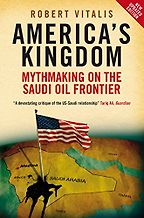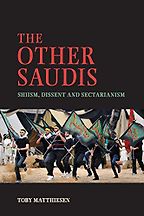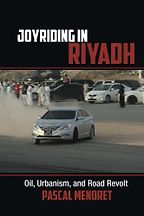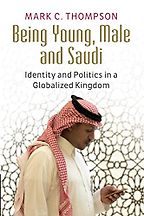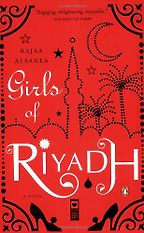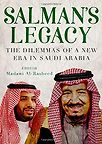Before we discuss your books on Saudi Arabia, could you tell me a bit about your background. Did you grow up in Saudi Arabia?
I lived in Saudi Arabia until I was 13 or 14 years old.Then there were some political problems between my father and the government, so he left for Lebanon and I lived in Lebanon between 1975 and 1982. I went to middle school and high school in Lebanon during the civil war. My parents left Lebanon in 1980, but I stayed to finish my International Baccalaureate. I graduated from the International College in Beirut and then went to the American University of Beirut for one year. Then, in June 1982, I had to be evacuated because of the Israeli invasion of the country. I went to Paris to join my parents, but I didn’t want to live in France so I came to Britain in 1983. I went to Manchester for my undergraduate and then to Cambridge for my MPhil and PhD. I then moved to Oxford as a research fellow.
Am I right in thinking that you are in bad odour with the Saudi government? Are you allowed back in the country?
I inherited exile from my father, but the biggest issue I had with the Saudi government was on finishing my PhD. My supervisor was Ernest Gellner and I wrote my PhD on the formation of the state in pre-oil Arabia. The Saudi government got hold of my PhD manuscript, which I was preparing to turn into a book, and told my father that if I published it they would take disciplinary action against me because they didn’t like the revisionist history I presented. I did publish, but the Saudi authorities felt that it exposed the government and the marriage strategies of the King and talked about the King’s wives and that this was not acceptable.
My father did eventually reconcile with the regime, so we went back for a while in the late 1980s. But every time I wrote a book they objected, and I realised that I couldn’t go back. Then, in 2005, they withdrew my nationality—by phone—simply because I went on television to talk about the municipal elections. I said that these were really unimportant municipal elections. I pointed out that women were excluded as voters and candidates, that only half of the council would be elected, and that, in any case, I really didn’t want to participate in an election where the only thing to decide on would be the sewer system.
Let’s turn to the books. I found all of them fascinating. Let’s look first at America’s Kingdom: Mythmaking on the Saudi Oil Frontier by Robert Vitalis. What insights into the country does this book offer?
It may appear that this book is about Saudi Arabia but, in fact, it’s also about America. Vitalis does a very good job of explaining American oil culture and its projection abroad, which I didn’t know a lot about before. I knew about the Saudi side of the work of the oil companies, how people lived in Aramco camps and the kind of work ethic Aramco introduced into Saudi Arabia, which had not known any kind of industry or mass production before.
I learned a lot about America and American oil culture and its interaction with indigenous people. As an anthropologist, I found it fascinating to read about how the racism that developed in the US was projected abroad. Vitalis does a great job of explaining how the context of American corporate culture and the racism that goes on in America affected the rest of the world. I was fascinated by how the Arab workers were segregated from the American workers. It’s a story with a lot of strands. You have oil, you have class, you have race and you have gender, because these white American corporate men brought white women as secretaries.
“Mohammed bin Salman wants to create a ‘Saudi Nation’. He is responding to or trying to engage with populist nationalism. Like ‘America First’ we now have ‘Saudi Arabia First’”
It’s the story of this fascinating world that was planted in the desert. He examines how Saudis reacted to this world, the demands they made and the demonstrations they staged to object to the segregation that the Americans imposed in the Aramco camps. It’s very well written and a meticulous and empirically grounded work. I’m disappointed that because his work tells a truth that many American policymakers don’t want to hear, Vitalis has been sidelined and left uninvited to big events in Washington.
I know some people who have lived in Saudi Arabia because their parents worked there. I had always assumed that the segregation was imposed by the Saudis, but this book shows that clearly wasn’t the case.
I knew a Saudi woman whose father was one of the first Saudis who worked as a translator for Aramco and she grew up in an Aramco camp. She went to the American school and she used to celebrate Halloween and Thanksgiving and Father Christmas in the desert. In one of my books, I followed the oral narratives of the first cohort of Saudis who worked in Aramco. The Americans created a world completely out of place and out of time. It was a walled compound and because there is a lot written about the civilizing role of the American oil company—in terms of introducing education and lifestyle amenities like cinemas, television and—this other aspect is forgotten. This book captures a very interesting moment that a lot of people have forgotten about.
And the mythmaking he refers to in the title, is that specifically around this idea of the US’s “civilizing” influence?
Yes, absolutely. He challenges the idea of a civilising mission. They gave some of Aramco’s wealth as oil rent to the monarch of Saudi Arabia, but their culture didn’t actually spread everywhere. Where it did go, it introduced bad practices like segregation and racism.
Get the weekly Five Books newsletter
The other fascinating aspect is how Aramco and the monarchy were accomplices in suppressing workers of all nationalities. Saudi Arabia introduced legislation to ban demonstrations, civil resistance, sit-ins and strikes, simply because the workers in Aramco were doing all these things to demand better wages and better living conditions. The chief executives at Aramco would put pressure on the Saudi government and the Saudi government would send the police force to suppress any kind of protest.
Okay, let’s move on to The Other Saudis: Shiism, Dissent and Sectarianism by Toby Matthiesen. What story does this book tell us about Saudi Arabia?
It is true that the Shia, who are a minority in Saudi Arabia, have benefited from oil in the sense that they have been employed by the Aramco oil company. At the same time, they have been the most activist group of people, the most rebellious. They have benefited from oil because the territories that the Shias have lived in for generations are so close to the oil fields. But, at the same time, they are discriminated against as a religious group because they have a different religious tradition from mainstream Wahhabi Islam. From 1913, when the Eastern Province came under the control of the Al-Sauds, you begin to see discrimination against Shias. They were not allowed to express their religious beliefs or practise their rituals. There is also serious discrimination in employment. They are employed by Aramco, but it’s very unlikely that any of them would ever be promoted to the top jobs. They are excluded from the judiciary and from the military and there is all sorts of other discrimination.
“Vitalis does a great job explaining how the context of American corporate culture and the racism that goes on in America affected the rest of the world. It’s a story with a lot of strands. You have oil, you have class, you have race and you have gender.”
Matthiesen captures the resistance of this community. He talks about how they define the community and why there has been a high level of activism in the Eastern Province right up to the present day.
What forms of activism work, given that there’s not much of a legitimate political space in Saudi Arabia?
Since the discovery of oil and the employment of the Shia in the oilfields, the Shia have responded to all the political movements that have spread through the Arab world. In the 1950s and 1960s, they were drawn to Arab nationalism, but also socialism and communism. They were always very active in trying to express their sense of marginalization by engaging with these ideologies. Matthiesen describes in great detail how, in the 1970s, they were drawn to the Islamist movement in Iran. This is important, because it changed the language of resistance from the secular one of the 1950s and 1960s to a more religious one after the Iranian Revolution. He has a great command of the sources in Arabic—books on history and ideology—that the Shia have produced.
His book has been criticised by some Saudis because it’s seen as focusing on a minority issue that plays to the Western interest in religious minorities across the Middle East, in trying to project them as discriminated against. A lot of Saudis don’t like his book simply because it highlights the issue of discrimination. Other Saudis think that he overemphasises the sectarian element.
You mentioned that things changed in terms of the ideological vehicle for political opposition after the Iranian Revolution. Before that, were the Shia building alliances with their Sunni compatriots or was resistance always focused on the Shia community?
Before the 1970s, the Shia had engaged with other Arabs—as communists, as Baathists, as socialists—and they worked together. I don’t want to overemphasise the role of the Iranian Revolution in pushing the Shia towards an Islamist agenda. Islamism had become important in Saudi Arabia and around the Muslim world in general before the Iranian Revolution. Arab nationalism collapsed as an ideology after the 1967 Arab-Israeli War, but the sentiment that inspired it remained and the Shia, like the Sunnis, engaged in Islamist politics simply because there was this vacuum.
Now to Joyriding in Riyadh by Pascal Menoret. What’s important about joyriding in Riyadh, both as an activity and as a book?
Joyriding in Riyadh is actually about the largest cohort in Saudi society, the youth. It’s about rural-urban migration. It’s about poverty and boredom. It’s about young men skidding cars and doing things to try and achieve a near-death experience—and there have been a lot of deaths, as Menoret documents in his book.
Five Books interviews are expensive to produce. If you're enjoying this interview, please support us by donating a small amount.
It’s also about urban development and how foreign companies walk into Saudi Arabia, tempted by huge contracts, and design a city and a way of life without actually understanding the country at all. The book is about the consequences of urban development and its impact on young people who live in the cities and how they feel about their cities and about how they are excluded from the centres of the cities. It looks at the subcultures that emerge in this environment, subcultures of criminality, of bravery, of assertive masculinity. All these kinds of issues that are associated with angry young men are explored in the book and it’s very interesting.
The thing I found fascinating about this book, particularly in the light of what you learn from America’s Kingdom, is that it shows how, far from being a traditional society, Saudi Arabia is actually in some ways a very modern society and very much built on Western lines.
Absolutely. Texas in the desert or Texas in Arabia. That’s what the cliché is, because of the way the cities are designed. Immigrants who come from rural areas, mostly less educated with fewer opportunities, gravitate towards certain pockets of the city. They are educationally low achievers and they drift into some kind of rebellion. Joyriding in Riyadh is not about criminality. It’s not about depicting the youth as difficult and criminal, it’s about looking at the culture that emerges in these marginal areas in a city where you have to have a lot of wealth to live well.
How does Menoret see joyriding as socially subversive?
I think Menoret explains it as a way of reclaiming the urban space. It’s asserting that this is your territory and you can do what you want in it. It is a dangerous game and there have been a lot of deaths. But it has become a cult, with its poetry and its imagery of constructed masculinity, friendship, camaraderie and solidarity between groups. It’s more than just a silly game that people engage in.
Now on to Being Young, Male and Saudi: Identity and Politics in a Globalised Kingdom by Mark C Thompson. Thompson’s a British academic. What does he say in his book about being young and male in Saudi Arabia? What’s his focus and how does that fit in with Joyriding?
While Menoret focuses on the subculture of relatively deprived young men who use joyriding as a way of resistance, Thompson focuses on high achievers. Thompson works at one of the élite universities in Saudi Arabia, the King Fahd University of Petroleum and Minerals. He has access to a lot of men in his classes—no women because there’s segregation in the universities—and he was able to conduct research by doing focus groups all over Saudi Arabia.
His conclusions are about this youth cohort who have become important in the political rhetoric of the leadership. When Mohammed bin Salman came to power in 2017, he immediately addressed the youth and depicted himself as young like them, determined to help them achieve their potential, to create an entrepreneurial culture, to help turn them into active workers and offer them jobs. Thompson looks at this cohort that has been highlighted as the future of Saudi Arabia after oil—the human resource—and he tries to explain their views on a range of issues. For example, what they think about national identity and what it means to be a Saudi. The project gave a lot of young people the freedom to express their opinions and publicly doubt whether there really is a Saudi nationality or a Saudi nation. And they’re absolutely right.
I see that linking up with the work I have done, in which I looked at three attempts at creating a nation, all completely different. At the beginning, with the establishment of the state, there was the religious nationalism of the Wahhabi movement, which was regarded as a homogenizing nationalism that would turn everybody into one pious nation. But that one pious nation is a very divisive ideology because it excludes the Shia and it excludes the Sunni Muslims in Hejaz because they are Sufi or have certain rituals that don’t conform to the Wahhabi tradition. That was the religious nationalism of the first phase.
Then we come to the 1960s and we have pan-Islamism. The government deliberately promoted pan-Islamic sentiments and solidarity for specific political and diplomatic reasons and Saudis were told that they were Muslims and they should help Muslims everywhere and they should support Muslim causes.
Then we come to the beginning of the 21st century and Mohammed bin Salman who wants to create a ‘Saudi Nation’. He is responding to or trying to engage with populist nationalism. Like ‘America First,’ we now have ‘Saudi Arabia First’.
Thompson shows that people are ambivalent about this Saudi nationalism. They don’t know what it is. They have strong regional identities. They have strong tribal identities. Although now everybody lives in cities, which look homogeneous, in fact, they are very segmented. People live in pockets in the city. In Britain, where you live is determined by your income and by what you can afford. In Saudi Arabia you have, on top of that, tribal neighbourhoods.
What does the lack of national identity that Thompson identifies suggest for the future of the country?
Thompson is very clear in his view that without the Crown Prince’s Vision 2030 succeeding, which means that they have to provide jobs for this cohort of young men—and women now—the future is going to be bleak.
“Girls of Riyadh seemed to provoke the realisation that Muslim women actually have a sexual life and they talk about it in very open ways among themselves.”
One thing Thompson doesn’t explain is why so many young Saudi men are actually leaving the country and applying for asylum abroad. He doesn’t talk about that and how, since Muhammad bin Salman came to power, there has been a 380 per cent increase in the number of asylumseekers and refugees leaving the country.
And on what basis are they claiming asylum?
On the basis of freedom of speech and as a result of repression, which has increased incredibly since Salman became king in 2015. Some of these young asylumseekers had been on government scholarships to study abroad in Canada, the US or Britain, but they move from being students to asking for asylum simply because they have engaged with what was going on in the Arab world in 2011 or they have encouraged protests or supported protests in Saudi Arabia and outside.
Let’s move on to the Girls of Riyadh by Rajaa Alsanea. This is a piece of chick lit…
Yes. I chose it to illustrate what the West looks for in Saudi Arabia. It’s written as a series of email exchanges between four or five girls who talk about all sorts of things that young girls talk about, from relationships, to makeup, to going out. They discuss and debate all sorts of things, but it’s a very, very simple book with, I think, minimal literary qualities.
It is obviously not a work of world literature, but it got huge publicity in the West. It was translated into over 25 languages. It was regarded as a liberating text for Saudi women and the author, who’s a very young dentist, had the foreword written by the Saudi ambassador in London at the time. He endorsed the book. But the book was initially banned in Saudi Arabia, where the author was living. There were also religious “opinions” about the book. I wouldn’t call them fatwas, but religious opinions against the author because she was seen as tarnishing the reputation of the girls of Riyadh by depicting them in the way she did.
What was interesting was the hype about this text in the West. I looked at it as a window to examine Western thinking about Muslim women, especially Saudi women. Everybody who reviewed the book or wrote about it in the media praised it for its almost revolutionary impact and for the bravery of the author. Rajaa Alsanea hints at sexual encounters, but without actually being very explicit. Yet the act of talking about sex on paper was regarded as a revolutionary act. People in the West think that Arab culture is like the middle-class culture in Britain or France where sex is a taboo and women don’t talk about it. It’s only in recent times that talking about sex entered the public sphere in the West, and there are quite a lot of people from particular classes in the West who look down on and are apprehensive about the public discussion of sex. But Arab or Muslim women talk about sex all the time. They just talk about it in different contexts.
The book seemed to provoke the realisation that Muslim women actually have a sexual life and they talk about it in very open ways among themselves. It is part of an oral culture. People in the West don’t realize that historically in Islamic civilization there were sexual manuals published and circulated—written by men mostly—about sex. So, the publication of this book exposed this ignorance in the West about the sexual lives of Muslims and the fascination with them. It’s almost like an orientalist-fixation fetishism.
Five Books aims to keep its book recommendations and interviews up to date. If you are the interviewee and would like to update your choice of books (or even just what you say about them) please email us at [email protected]
